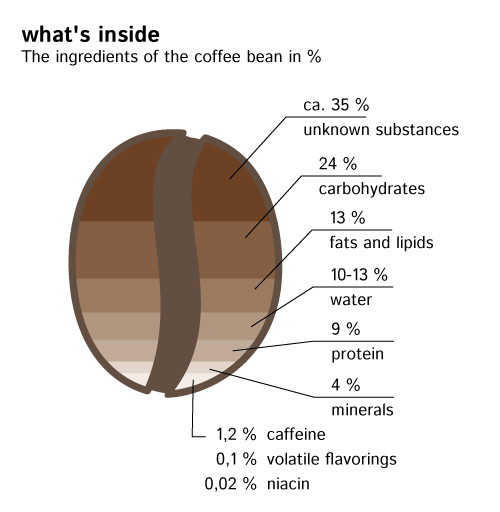Ingredients and effect
Coffee contains more than 1,000 substances, of which one still not all has chemically decrypted. The proportions vary depending on the type of coffee, growing conditions of the plant and the roasting process. The main ingredients of the coffee bean are carbohydrates, fats, water, proteins, acids, lkaloide (caffeine), minerals and flavorings.
 The carbohydrates makes in about one third of the coffee bean, but are converted during roasting to other compounds or completely dismantled. What remains are almost exclusively water-sugar substances which are retained by infusion in the coffee grounds. Green coffee contains about ten to twenty percent fats, but as they are largely insoluble in water, they come in the coffee before hardly. The coffee bean contains ten to thirteen percent water, after roasting it, however, are only about two to three percent. During storage of coffee a small portion ambient humidity resumes. Green coffee is about one-tenth proteins. After roasting, they are virtually non-existent. By the action of heat proteins are destroyed or combine with other substances. In coffee over 80 different acids occur, they make four to twelve percent of the green coffee. The largest share is the characteristic of the coffee chlorogenic acid. Addition, however, linoleic acid, palmitic acid, acetic acid, citric acid, malic acid and oxalic acid are present, for example. Many of these have a strong influence on the taste. Alkaloids are nitrogen-containing natural substances, including caffeine counts. The best-known vitamins in coffee are the so-called B-vitamins - Vitamin B2 (Riboflavin), Vitamin B3 (Niacin), Vitamin B5 (pantothenic acid) and vitamin B6 (pyridoxine). These vitamins the body needs for energy, protein, carbohydrates and fat metabolism, the nervous system, blood formation and for the skin and hair growth. Minerals occur at three to five percent in green coffee and go to about ninety percent in the drink. Instant coffee contains even nine to ten percent minerals. Mainly come potassium, calcium, magnesium and phosphorus before, in traces of sulfur, manganese and iron. These nutrients are involved in the formation of bones and teeth, regulate the permeability of cell membranes that control the excitability of muscles and nerves and keep the acid-base balance upright.
The carbohydrates makes in about one third of the coffee bean, but are converted during roasting to other compounds or completely dismantled. What remains are almost exclusively water-sugar substances which are retained by infusion in the coffee grounds. Green coffee contains about ten to twenty percent fats, but as they are largely insoluble in water, they come in the coffee before hardly. The coffee bean contains ten to thirteen percent water, after roasting it, however, are only about two to three percent. During storage of coffee a small portion ambient humidity resumes. Green coffee is about one-tenth proteins. After roasting, they are virtually non-existent. By the action of heat proteins are destroyed or combine with other substances. In coffee over 80 different acids occur, they make four to twelve percent of the green coffee. The largest share is the characteristic of the coffee chlorogenic acid. Addition, however, linoleic acid, palmitic acid, acetic acid, citric acid, malic acid and oxalic acid are present, for example. Many of these have a strong influence on the taste. Alkaloids are nitrogen-containing natural substances, including caffeine counts. The best-known vitamins in coffee are the so-called B-vitamins - Vitamin B2 (Riboflavin), Vitamin B3 (Niacin), Vitamin B5 (pantothenic acid) and vitamin B6 (pyridoxine). These vitamins the body needs for energy, protein, carbohydrates and fat metabolism, the nervous system, blood formation and for the skin and hair growth. Minerals occur at three to five percent in green coffee and go to about ninety percent in the drink. Instant coffee contains even nine to ten percent minerals. Mainly come potassium, calcium, magnesium and phosphorus before, in traces of sulfur, manganese and iron. These nutrients are involved in the formation of bones and teeth, regulate the permeability of cell membranes that control the excitability of muscles and nerves and keep the acid-base balance upright.

